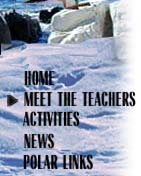
|
|
21 November, 1996
Journal November 21, 1996
This should be the last time I get to the ice edge for the year. Its a fun
trip and I'll miss going there. It's an opportunity to get on a skidoo and
see a little bit more of Antarctica. I've included a picture of our mode of
travel which shows an iceberg in the background. These are very common in
the sound, as the weather warms, pieces of the glacier that flow down Mount
Erebus break and float away. Although the icebergs don't pose a problem to
our trip, the glacier that produced them does. The glacier is grounded on
the bottom of the Sound. As it moves under its own weight, it stressing the
sea ice causing cracks which get wider and wider. When we started making
these trips several weeks ago, we had to go over cracks that were several
inches. Today one of them has opened to two feet. We all held our breath as
we went over it. I didn't think we were in personal danger but I knew we'd
look pretty foolish if we lost a skidoo. We've probably reached the limit
of what can be crossed safely. .
When we reached the ice edge we began searching for the experiments that
were set out five days ago. The dosimeters had moved from where they were
set but we had little trouble recovering them. This is such a dynamic
environment. When we started the experiment there was very little pack ice,
five days later the wind direction had changed, and the pack ice extended
as far as we could see. This makes doing in-situ experiments here
especially challenging. It is impossible to control all the variables. A
single experiment must often be repeated many times before usable data is
collected. The scientists assume equipment will break, weather will change,
and things will rarely go as originally planned. They know they must keep
making adjustments to suit the situation and maintain a positive attitude.
Under the circumstances, it's amazing that so much gets accomplished.
Dom Tedeschi
http:/www.neca.com/antarctica/
tedeschi@csec.mcmurdo.gov
Contact the TEA in the field at
.
If you cannot connect through your browser, copy the
TEA's e-mail address in the "To:" line of
your favorite e-mail package.
|
